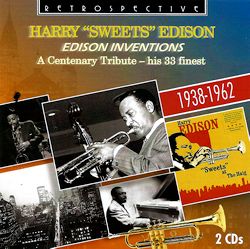CD1
Count Basie & His Orchestra
1. Every Tub
2. Shorty George
3. Rock-a-Bye Basie
4. Easy Does It
5. Tuesday at Ten
Harry “Sweets” Edison & His Quartet
6. September in the Rain
7. ‘Swonderful
8. Indiana
9. Pennies from Heaven
Barney Kessel & His Septet
10. Louisiana
Buddy Rich & His Quintet
11. Nice Work If You Can Get It
12. You’re Getting to Be a Habit with Me
13. All Sweets
The Lester Young-Harry “Sweets” Edison All Stars
14. Red Boy Blues
15. One O’Clock Jump
Frank Sinatra, Nelson Riddle & His Orchestra
16. We’ll Be Together Again
Nat King Cole & His Trio
17. It’s Only a Paper Moon
Harry “Sweets Edison” and His “Orchestra”
18. Hollering at the Watkins
19. Willow, Weep for Me
CD2
1. K. M. Blues
Red Norvo & His Sextet
2. Just a Mood
Harry “Sweets” Edison & His Sextet
3. Gee Baby, Ain’t I Good to You?
4. Blues for Piney Brown
5. Moonlight in Vermont
Ella Fitzgerald, Paul Weston & His Orchestra
6. Blue Skies
Harry “Sweets” Edison & His Sextet
7. The Very Thought of You
8. Fairground
9. Our Love is Here to Stay
Johnny Hodges and His “Orchestra”
10. Stompy Jones
The Harry “Sweets” Edison-Eddie “Lockjaw” Davis Quintet
11. Broadway
12. I’ve Got a Crush on You
13. A Gal in Calico
Harry “Sweets” Edison & Quartet
14. Embraceable You
The reason why Harry Edison was nicknamed “Sweets” is hidden in obscurity. Was it because of his sweet nature which attracted the ladies, or his liking for
sweet food? Another explanation is quoted from the Basie band’s guitarist Freddie Green, who claims that Lester Young gave Harry the nickname “Sweetie Pie”
because of his sweet sound – and Basie shortened it to “Sweets”.
Whatever the reason, there’s no denying that Harry Edison made a sweet sound on the trumpet, with a tone that seemed to savour every note. This often
resulted in Harry holding a note for some while, or repeating it over and over, which was one of his trademarks. In fact he used several catch-phrases,
which recurred in his solos with great regularity. Sometimes this gave the impression that he was limited in the range of his ideas, yet the listener could
enjoy the sweet sound however repetitive it was.
This double CD provides a useful survey of Harry Edison’s career, although it stops at 1962 (Harry continued playing and recording into the 1990s). It
begins where Harry’s fame started: with the Count Basie band. Harry contributed a fine solo to Every Tub in 1938. It includes one of the Edison
catch-phrases: swaying up and down on a note. His solo in Rock-a-Bye Basie contains the same device. Harry stayed with Basie until 1950, when the
band disbanded. Thereafter he recorded with many different small groups, where his undoubted ability to swing propelled every session.
He led his own quartet in tracks 6 to 9, where his exposure as the main soloist allows us to sample his trademark style. Yet another catch-phrase occurs in Pennies from Heaven, where he plays a phrase which became the basis of Plaid, a memorable later recording (sadly not included here) with
Art Tatum and Lionel Hampton. Tracks 10 to 12 contain excellent examples of his muted playing, a feature which he used to advantage in the background of
Frank Sinatra recordings like We’ll Be Together Again.
In Count Basie’s band, Edison was a close friend of Lester Young, and Harry’s fiery style contrasts well with Lester’s sleepy approach (tracks 14 and 15). It’s Only a Paper Moon includes yet another Edison trademark: a quotation from Music, Music, Music. One good feature of these
compilations is that one can hear a variety of other fine musicians beside the main protagonist. Drummer Alvin Stoller is unusually extrovert in September in the Rain (track 9), while Buddy Rich drives two nice bouncy rhythm sections in tracks 11 to 15.
Yet another of Harry’s catch-phrases – a series of rising triplets – is audible in the first track of the second CD. The Edison catch-phrases are well in
evidence on Just a Mood, a classic 1957 recording taken at a relaxed tempo. It includes Red Norvo managing to swing on the unforgiving xylophone,
as well as one of many inventive solos by tenorist Ben Webster (hear how he caresses the melody in Moonlight in Vermont!). One of my favourite
tracks on the second CD is Stompy Jones – taken from the wonderful Side by Side album led by Duke Ellington. Here I have a minor grouse
with the way that this album gives the names of the artists for each LP. This track is listed as by “Johnny Hodges – alto saxophone, & his “Orchestra”.
This suggests that Hodges was leading what he called an “orchestra” but that title might not have been deserved. In fact the original album is shown as by
“Duke Ellington & Johnny Hodges plus others”. Another mis-naming is that Harry Edison is described as “Sweets” for every track here, even though the
original albums were often just by “Harry Edison”.
Despite a few minor faults, this album is a decent selection of Harry Edison’s recordings. The recording quality is generally fine, although I’ve Got a Crush on You sounds a bit weird. There is plenty of added information from compiler Ray Crick, plus enthusiastic sleeve-notes by Digby
Fairweather. This compilation shows convincingly how Harry Edison was a bright spark, lighting up every ensemble with which he played.
Tony Augarde
www.augardebooks.co.uk
